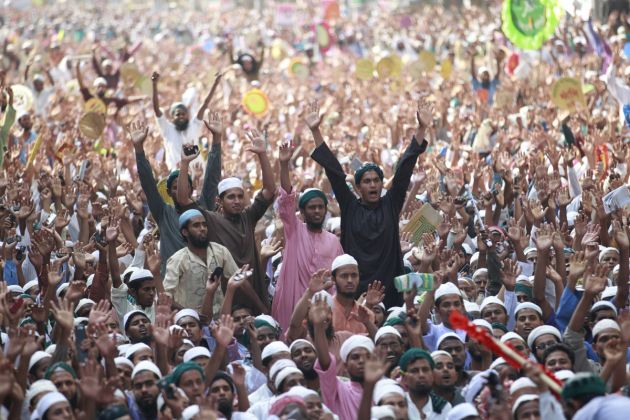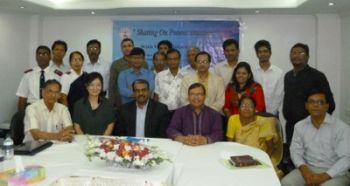Christian mintority under pressure in Bangladesh, churches group finds

In February, a Bangladeshi war crimes tribunal sentenced 73-year-old Delwar Hossain Saydee to death.
Sayee, vice president of the Islamist Jamaat-e-Islami party, was convicted – among other crimes – of mass killings, rape and the forcible conversion of non-Muslims during Bangladesh's 1971 fight for independence.
Immediately after Sayee's sentencing, which Human Rights Watch has called "flawed," Jaamat supporters began violent protests in more than a dozen cities.
Increasingly, they have been targeting religious minorities, and the result has been "nightmarish" conditions for non-Muslims.
More than 100 people have died and numerous places of worship have been razed.

Last week, the World Council of Churches' commission on international affairs sent an ecumenical group to Bangladesh to offer solidarity with persecuted groups.
From April 5 - 8, a delegation from the world churches grouping met interfaith and Muslim groups, representatives of the Roman Catholic Church and the Bangladesh Hindu Buddhist Christian Unity Council (BHBCUC).
The delegation from the WCC, a church grouping representing more than 500 million Christians, heard how minorities fear for their survival.
"[Religious minorities] are the main target of endangering Bangladesh to become a 'zero minority country' in future at the behest of the extremist groups," they were quoted as saying in a WCC report.
Thus far, Buddhists and Hindus have been hit the hardest by the new wave of violence; nearly 90 Buddhist and Hindu places of worship have been attacked.
However, Rev. David Anirudh Dass, general secretary of the National Council of Churches in Bangladesh, said Christians still face a particular danger.
"Although Christians in the country have been spared from attacks this time," he told the WCC, "they are still more vulnerable than Hindus or Buddhists for being the only microscopic minority likely to face stark eventualities."
When the Indian sub-continent won independence from Great Britain in 1947, it was split into three parts: the majority Hindu India and the majority Muslim East and West Pakistan.
In 1971, East Pakistan waged a war for independence from West Pakistan, and became Bangladesh nine months later.
Jamaat opposed the break.
According to the WCC, prior to 1971, religious minorities comprised 30 percent of East Pakistan's population.
However, in 1988, Islam was declared the state religion and as a result, Hindus, the second-largest religious group after Muslims, comprise less than 10 percent of the population.
Christians now make up less than half of one percent of the population in Bangladesh
The WCC is collaborating with the Bangladesh Hindu Buddhist Christian Unity Council on a presentation to the United Nations Universal Periodic Review later in April month about the persecution of religious minorities in Bangladesh.
